Wednesday, February 5, 2020
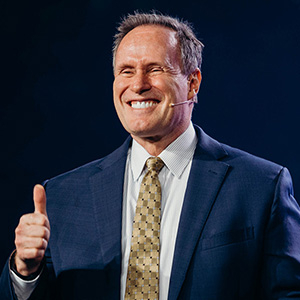
Stephen Covey leads afternoon sessions with LUCOM student-doctors as well as faculty and staff on higher levels of trust
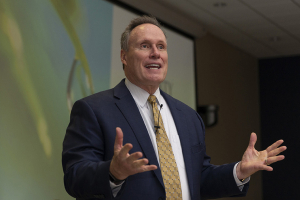 Chris Breedlove | LUCOM Marketing
Chris Breedlove | LUCOM Marketing
Liberty University College of Osteopathic Medicine (LUCOM) welcomed for the first-time leadership expert Stephen M. R. Covey on Friday, Jan. 31. His visit came by way of invitation from LUCOM’s Office of External Affairs and Faculty Development. He spoke directly to Liberty osteopathic medical students for one afternoon session followed by a breakout session to LUCOM faculty and staff, both sessions focused on building higher levels of trust and setting clear expectations.
“Stephen has presence and performance. He engages his audience leading them through the concepts and practices in a delightful, entertaining fashion,” said Peter Bell, DO, dean of LUCOM. “We all need to pursue self-improvement every day. Building trust with others expedites achieving mutual success in less time with less cost while energizing all.”
Covey is a New York Times and #1 Wall Street Journal best-selling author of The SPEED of Trust—The One Thing That Changes Everything. He is the former CEO of Covey Leadership Center, which, under his stewardship, became the largest leadership development company in the world. Covey personally led the strategy that propelled his father’s book, Dr. Stephen R. Covey’s The 7 Habits of Highly Effective People, to become one of the two most influential business books of the 20th Century, according to CEO Magazine. He is a highly sought after and compelling keynote speaker and advisor on trust, leadership, ethics, and high performance.
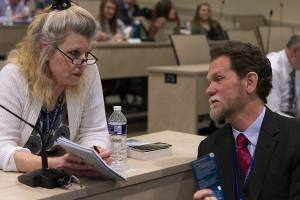 “Inspiring and extending trust is a collection of behaviors that need to be practiced until it becomes part of you,” added Dr. Bell.
“Inspiring and extending trust is a collection of behaviors that need to be practiced until it becomes part of you,” added Dr. Bell.
During the early afternoon session with Liberty’s osteopathic medical students, Covey addressed many of the stressors they face as medical students as well as how they could build and reinforce trust with each other to then, one day, extend to a trusting doctor-patient relationship in their careers.
“As a physician, help your patients by encouraging them to build trust with you which leads to their greater well-being and hopefully longer life,” said Covey. “Trust is a function of two things: credibility and behavior. The framework for credibility can be compared to the stump of tree, the foundation is character, and the branches are competence. Patients will want to trust your credibility.”
Covey expanded on credibility with four cores: integrity, intent, capabilities, and results.
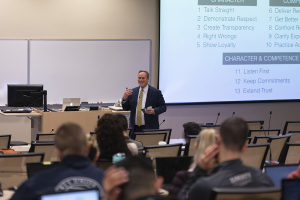 “Integrity is truthfulness. Intent is your fundamental motive. Capabilities inspire confidence and is the capacity to achieve results,” Covey added. “And finally, results. Results matter because they measure your past performances, current performance, and what’s to come.”
“Integrity is truthfulness. Intent is your fundamental motive. Capabilities inspire confidence and is the capacity to achieve results,” Covey added. “And finally, results. Results matter because they measure your past performances, current performance, and what’s to come.”
The main theme throughout Covey’s student presentation was trust. “Relationships of trust change everything. Low trust leads to low energy and low energy leads to low joy. Nothing is as exhausting as low trust,” he added. “Learn how to build trust and trustworthy teams. Build higher trust for higher energy and ultimately, higher joy.”
Near the end of his presentation, Covey challenged the student-doctors to take a look at their own integrity, intent, capabilities, and results. He encouraged them to focus on a specific one and get better at it. “What’s the difference between honesty and integrity? Honesty is when your words match reality. Integrity is when your reality matches your words.”
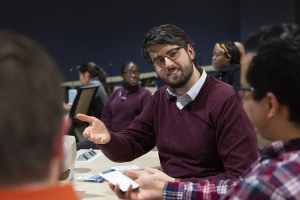 Covey left the medical students with a foundational message from The SPEED of Trust—The One Thing That Changes Everything. He explained that the Five Waves of Trust are self-trust, relationship trust, organizational trust, market trust, and societal trust. “I’ll leave you with one more element of trust and that’s the most important, trust in God,” he added.
Covey left the medical students with a foundational message from The SPEED of Trust—The One Thing That Changes Everything. He explained that the Five Waves of Trust are self-trust, relationship trust, organizational trust, market trust, and societal trust. “I’ll leave you with one more element of trust and that’s the most important, trust in God,” he added.
Shortly after presenting to the students, Covey turned his attention to LUCOM’s faculty and staff. During this session, he expanded on the 13 Behaviors of High Trust defined in The SPEED of Trust—The One Thing That Changes Everything.
The 13 Behaviors of High Trust are
- Talk Straight
- Demonstrate Respect
- Create Transparency
- Right Wrongs
- Show Loyalty
- Deliver Results
- Get Better
- Confront Reality
- Clarify Expectations
- Practice Accountability
- Listen First
- Keep Commitments
- Extend Trust
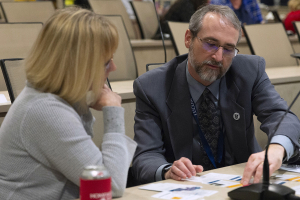 “Trust is earned. When you distrust, you create suspicion. You have to extend trust to receive it,” said Covey.
“Trust is earned. When you distrust, you create suspicion. You have to extend trust to receive it,” said Covey.
Covey warned that trusting others should not be a blind trust, but rather a smart trust. “There is a risk in trusting people and there is also a risk in not trusting people. In a collaborative, interdependent world, I think not trusting is perhaps more often the greater risk. Use good judgement. It is simply command and control vs. trust and inspire.”
During this presentation, Covey asked the faculty and staff to pair up and communicate openly. He challenged them to pick three behaviors in the 13 Behaviors of High Trust and commit to one another that they would work specifically on those three in the days to come.
“I admire what you’re doing at LUCOM. It’s an honor to be here. Always remember, nothing is as economical than the speed of trust. Nothing is as inspiring,” Covey said.
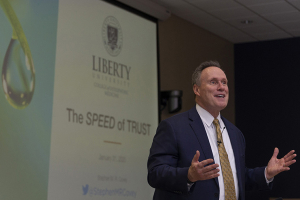 Linda S. Mintle, PhD, professor and chair of behavioral health, was one of the faculty members present and found his remarks inspiring. “Covey’s presentation of trust as learnable, an economic driver, and a competency of leadership was capped by a challenge to extend trust to others.”
Linda S. Mintle, PhD, professor and chair of behavioral health, was one of the faculty members present and found his remarks inspiring. “Covey’s presentation of trust as learnable, an economic driver, and a competency of leadership was capped by a challenge to extend trust to others.”
“Distrust is contagious and when leaders don’t trust their employees, their employees don’t trust them—that was a powerful statement. What I found extremely useful was contrasting a command and control type of leadership to one that trusts and inspires. The difference has everything to do with retaining your employees, innovating and unleashing the potential of people to make an organization thrive,” said Dr. Mintle.
Prior to visiting LUCOM, Covey first stopped on the main campus of Liberty University to be the morning’s convocation speaker. There he addressed undergraduate students on trust and credibility. “Trust is the number one competency of leadership needed today. Leadership is a choice, not a position. You can choose to lead, and trust is a learnable skill,” he said. ““You must start from the inside out and trust in God. Then trust can ripple out.”
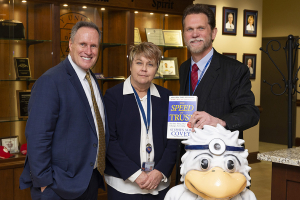 Alisa S. Dyson, EdD, senior director of external affairs and faculty development, was instrumental in bringing Covey and his team to visit Liberty. “In the riveting style of The Tipping Point , Stephen M. R. Covey uncovers the overlooked and underestimated power of trust in a gripping look into what he calls ‘the one thing that changes everything,’” she said. “The Speed of Trust presents a road map to establish trust on every level, build character and competence, enhance credibility, and create leadership that inspires confidence. Fundamentally, this is exactly what is needed at this stage of LUCOM’s growth and development in its quest to be a model institution of excellence in medical education.”
Alisa S. Dyson, EdD, senior director of external affairs and faculty development, was instrumental in bringing Covey and his team to visit Liberty. “In the riveting style of The Tipping Point , Stephen M. R. Covey uncovers the overlooked and underestimated power of trust in a gripping look into what he calls ‘the one thing that changes everything,’” she said. “The Speed of Trust presents a road map to establish trust on every level, build character and competence, enhance credibility, and create leadership that inspires confidence. Fundamentally, this is exactly what is needed at this stage of LUCOM’s growth and development in its quest to be a model institution of excellence in medical education.”